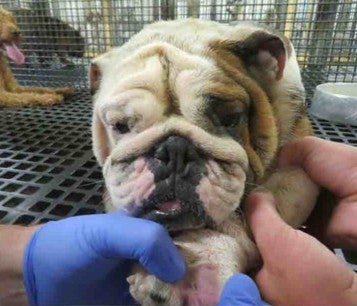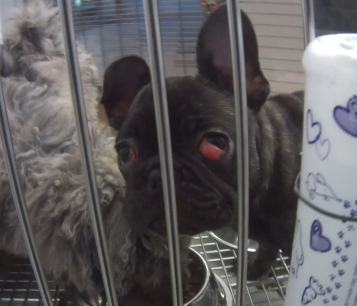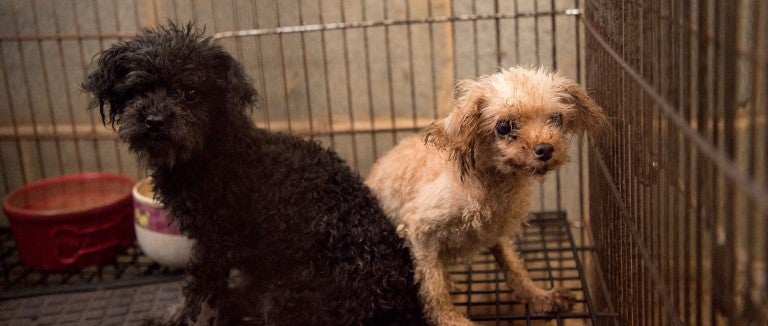There are more than 10,000 puppy mills in the U.S., most of which market themselves as “USDA approved” “small family breeders.” Despite what they may tell you, most (if not all) pet stores sell puppy mill puppies, and most (if not all) commercial breeders house parent dogs in conditions most people would consider animal cruelty. Here's a list of common claims by pet stores and puppy mills and what they really mean.
What they say:
"All of our puppies come from USDA-inspected facilities, so we know they’re not from puppy mills,” or “We’re USDA approved.”
What they really mean:
“Our suppliers/we met the minimal standards for a USDA license, which legally allow breeders to keep parent dogs in small cages for their entire lives.”
There are no USDA "approved" breeders. There are USDA licensed breeders. Being USDA or state government-inspected does not mean that the business is not a puppy mill.
Current USDA regulations require bare minimum survival standards, allowing breeders to keep breeding dogs behind bars from birth until death, without ever feeling grass under their feet, enjoying a treat or toy, or receiving loving human contact or proper veterinary care. They are bred repeatedly until they can no longer reproduce, and then they are destroyed or discarded.
Many USDA facilities have been found in violation of even these minimal standards, yet it’s extremely rare for the USDA to revoke a commercial breeder's license or even fine a puppy mill that has repeated violations. There are hundreds of USDA-licensed puppy mills in operation that have long lists of violations and problems associated with them and yet regularly sell to pet stores.
In May 2010, the Office of Inspector General released a scathing report criticizing the USDA's history of lax oversight of dog breeders under the Animal Welfare Act. Since then, follow up reports show little has changed.
Our annual report documenting 100 of the country's known puppy mills has been released for 2024.

What they say:
“We know our breeders aren’t puppy mills because we only deal with breeders we know. We’ve never had any issues with puppies from our breeders.”
What they really mean:
“We have been receiving shipments of puppies from the same place repeatedly. We’ve never visited the breeder's facility or inspected their records. We just buy puppies.”
Anyone who puts two dogs together and produces puppies is technically a breeder. Responsible breeders do not sell their puppies to pet stores. Most breed clubs' Code of Ethics state that their breeders refuse to sell their dogs to pet stores or any other commercial sources of distribution. Our investigations have revealed that even when pet store staff claim they inspect their facilities or hand-pick their puppies, often it’s not true.
Sometimes pet stores will claim to source puppies from out of state because those states have more breeding regulations, implying they’re doing something noble. Know that commercial breeders in all states are required to be regulated by the USDA. Some states (such as Missouri and Pennsylvania) also require a state kennel license and state inspections. This does not mean that puppies from Missouri or Pennsylvania are healthier. In fact, these states have two of the worst concentrations of puppy mills in the United States.
Even if the store’s puppies were healthy, the parent dogs would continue to live in conditions most people would consider animal cruelty—and by buying one of their offspring, you would be supporting and perpetuating this cruelty.
There are thousands of puppy mills—mass-breeding operations where mother dogs spend their entire lives in cramped cages—across the country being supported by pet stores like Petland.

What they say:
"Our store's puppies are guaranteed healthy. They come with a health certificate from a licensed veterinarian,” or “Our puppies come with purebred registration papers and a health guarantee."
What they really mean:
“We meet the minimum requirements for any puppy sold commercially across state lines. If you sign this, it limits my liability if your puppy gets sick.”
A health certificate is not a bonus but a required document for any puppy sold commercially across state lines. It only means that the puppy has had a very brief "wellness" check by a veterinarian. This examination does not include testing the puppy or their parents for genetic disorders, parasites or diseases such as Giardia and Brucellosis, both of which are contagious to humans and are frequently found in puppy mill puppies.
Puppy mills routinely sell puppies with papers from prestigious sounding kennel clubs. Purebred registration papers (from one of many kennel clubs or other dog registries) are only a record of a puppy's parents (and sometimes earlier generations). Registration papers do nothing to ensure that an individual puppy or their parents are healthy or free of genetic defects or that they were raised in a humane and clean environment.
Read health guarantees very carefully. They are often designed to protect the seller’s interests more than yours. They can be full of exclusions and loopholes, and often require you to return a sick puppy to get a refund. Sellers will often use the puppy's health certificate as proof that the animal was healthy when he or she left with you, leaving you helpless if the puppy becomes sick just a few hours or days after purchase.
Bad breeders will give you a list of treatments they administered themselves, rather than a record from a licensed vet. If the seller has administered their own vaccinations, ask for a detailed explanation. Each vaccination listed on the record should be accompanied by a small label with the expiration date and lot number of the vaccine (which the manufacturers provide in self-stick format with each vaccine for this very purpose). Without these records, you have no proof that the seller administered the correct vaccinations on schedule.
A responsible breeder will be able to provide you with the name and number of their veterinarian, as well as proof of the puppy’s full veterinary examination on their veterinarian's letterhead. Many will also provide you with health reports and screening results for the puppy's parents.
Puppy mills force animals to live in deplorable conditions. You can stop this cruel cycle by pledging to adopt from a shelter or rescue or purchase from a responsible breeder.
What they say:
"My place is hard to find. I'll meet you in the local parking lot,” or “Ours is a family business. We raise healthy puppies on our 20-acre farm, and you’re welcome to stop by, but you can only meet one puppy at a time because [insert excuse here]."
What they really mean:
"I don't want you to see where I keep all my dogs."
Almost every breeder has a family, and many commercial breeders breed puppies on family-owned farms. Don't assume that a website offering "farm-raised" or "family-raised" puppies isn't a puppy mill. Just because a breeder owns a 20-acre farm doesn’t mean their dogs have access to the outdoors.
Responsible breeders want to meet their puppy buyers face-to-face and will likely interview you as much as you interview them. They will be proud to show you where they keep all their dogs and will likely ask you to sanitize your hands or shoes before you enter to avoid getting vulnerable puppies sick. Be extremely wary of anyone who discourages you from visiting their facility or who invites you to their home or property, but only shows you one puppy at a time. Responsible breeders have nothing to hide.

